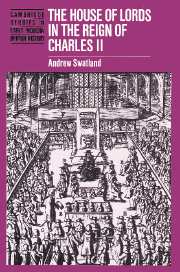Book contents
- Frontmatter
- Contents
- List of tables
- Acknowledgements
- List of abbreviations
- Note on the text
- 1 Introduction
- PART 1 FROM ABOLITION TO RESTORATION
- PART 2 MEMBERS AND THE BUSINESS OF THE HOUSE
- PART 3 KING, LORDS AND COMMONS
- PART 4 RELIGION
- 8 Religious composition
- 9 Church settlement
- 10 Religious nonconformity
- PART 5 POLITICS
- Appendix 1 Temporal members of the House of Lords
- Appendix 2 The bishops, 1661–1681
- Index
- Cambridge Studies in Early Modern British History
9 - Church settlement
Published online by Cambridge University Press: 12 October 2009
- Frontmatter
- Contents
- List of tables
- Acknowledgements
- List of abbreviations
- Note on the text
- 1 Introduction
- PART 1 FROM ABOLITION TO RESTORATION
- PART 2 MEMBERS AND THE BUSINESS OF THE HOUSE
- PART 3 KING, LORDS AND COMMONS
- PART 4 RELIGION
- 8 Religious composition
- 9 Church settlement
- 10 Religious nonconformity
- PART 5 POLITICS
- Appendix 1 Temporal members of the House of Lords
- Appendix 2 The bishops, 1661–1681
- Index
- Cambridge Studies in Early Modern British History
Summary
When in his Declaration of Breda (April 1660) Charles II appealed to his English subjects for unity he knew that religious differences were among the chief causes of disunion. The recently restored upper House, like the court, was not united on religious issues during the summer and autumn of 1660, though divisions between Presbyterians, ‘rigid’ Anglicans and Catholic lords did not become manifest until 1662. There were those peers who thought that religious unity could best be achieved by compelling obedience to a restored Anglican church, and others, including Presbyterians in both Houses, the king and most of his influential advisers, who preferred a relaxation of the laws against dissenters and accordingly proposed concessions on church ceremonial and the liturgy to encourage moderate dissenters to conform to a broad national church. The king's preferred religious settlement ultimately failed because of opposition from both intolerant country gentlemen and many of his own courtiers and government officials who dominated the Cavalier House of Commons. The Lords was usually more receptive to the king's religious policies in the early 1660s than the House of Commons. This feature, together with its role in the making of the church settlement, provide the main focus for this chapter.
When the king set foot on English soil on 26 May 1660, that great pillar of the monarchy, the Anglican church, no longer existed. It had been replaced first by a Presbyterian model and later under Cromwell by a broadly based national church, with toleration for peaceable nonconformist Protestant groups.
- Type
- Chapter
- Information
- The House of Lords in the Reign of Charles II , pp. 159 - 172Publisher: Cambridge University PressPrint publication year: 1996



